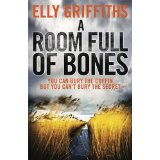When it’s time to leave the party
 I’m currently reading a very enjoyable series, Ellie Griffiths’ Ruth Galloway books. I read the first, The Crossing Places, a few years ago and it didn’t really take, but after the series was recommended by my friend Moira over at http://Clothesinbooks,com, I tried again with A Room Full of Bones and this time it did. I am now reading The Janus Stone and I’ve downloaded another one for when that’s finished. It’s a pleasure to come across a new series and know that there is a lot more good reading ahead.
I’m currently reading a very enjoyable series, Ellie Griffiths’ Ruth Galloway books. I read the first, The Crossing Places, a few years ago and it didn’t really take, but after the series was recommended by my friend Moira over at http://Clothesinbooks,com, I tried again with A Room Full of Bones and this time it did. I am now reading The Janus Stone and I’ve downloaded another one for when that’s finished. It’s a pleasure to come across a new series and know that there is a lot more good reading ahead.
At the same time I am working on the second in a series myself, and it’s got me thinking about what makes a successful series. The attraction for the reader is that cosy sense of catching up with people who have become friends. You know roughly what to expect. It’ll be the same but different. And that’s a very comforting feeling at the end of a long day when you’re settling down to read in bed. It can be very enjoyable for the writer too. You know your characters inside out and have got fond of them. Over a long series characters have time to develop. Indeed they must develop, because one of the dangers of a series is that it can get repetitious and run out of steam. The detective’s troubled love-life can get tedious and you risk the reader thinking ‘why doesn’t the guy just get a grip?’ Sometimes the writer gets fed-up before the readers, as Conan Doyle did with Sherlock Holmes, and Agatha Christie with Hercule Poirot.
Is there a case for limiting the number in a series as Swedish crime novelists, Maj Sjöwall and Per Wahlöö did – and Henning Mankell after them? In both cases the writers decided that there were only ever going to be ten. Nicholas Freeling may have gone too far in bumping off his detective Van Der Valk half-way through a novel, shocking and dismaying many readers (Trollope did something similar in The Last Chronicle of Barset). Another approach is to keep things fresh by starting another series to run parallel with the first, as Ellie Griffiths has done with The Zig-Zag Girl. Or simply to switch to a second series, as Martin Edwards has done so successfully with his Lake District mysteries.
I’m not going to name those writers who stayed too long at the party (it must be a temptation) and we’ll probably have different views about who they are. But I will list just a very few of my favourite series. They include Sjöwall and Wahlöö’s Martin Beck novels (10), Magdalene Nabb’s Marshall Guarnaccia books set in Florence (14), Martin Cruz Smith’s Renko novels (8). And then there’s Maigret. Simenon breaks all the rules. There are dozens of Maigret novels, but I can never feel there are too many.
4 Comments
Lyn
April 7, 2016I agree about the lure of a series, Christine. I love Elly Griffiths’ books & a lot of that is to do with catching up with Ruth, Harry, Cathbad etc. I enjoy the mystery plots but I think EG has been very clever at keeping the reader on tenterhooks about Ruth & Harry’s relationship. I also enjoy Martin Edwards’ Lake District series & Cynthia Harrod-Eagles’ Bill Slider books for the same reason. There’s a comforting feeling of meeting up with old friends plus a new mystery to unravel.
Christine Poulson
April 13, 2016Yes, that’s exactly it, Lyn. And it’s lovely when you discovered a new series and know that there are lots of treats ahead.
Sally Spedding
April 21, 2016An interesting article, Christine. Elly Griffiths’ books work for me because of the settings, which are vividly drawn. Sarah Rayne is tops in this department, with all her books, and as for Georges Simenon, you’re right. Many, many Maigrets, but never too many. He’s immortal…
Christine Poulson
April 21, 2016Thanks, Sally. Good to hear from you and I hope all is well.Sarah was a guest on my blog a while ago and she wrote one of my favourite theatrical novels, Ghost Song, terrifically atmospheric. Wonderful Maigret – now that I have an e-reader with a downloaded French dictionary I can just about manage them in French.